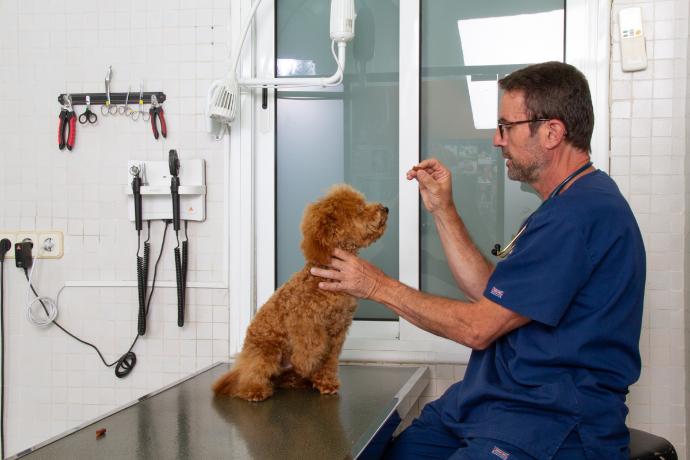Vaccinations
Vaccines play a crucial role in preventing various infectious diseases that can have serious consequences for animals. In our clinic, we take a proactive approach by establishing a rigorous vaccination program from the early stages of the puppy's life. Additionally, we are committed to sending annual reminders to adjust and keep this protocol up-to-date as the animal grows. This method ensures continuous and effective protection against diseases that could jeopardise the health of our animals.
Vaccination contributes to the well-being of animals, preventing the suffering associated with significant health issues.
Deworming
It is important to follow veterinary recommendations for an appropriate deworming program based on the specific needs of each animal. There are two types of deworming: internal, for intestinal parasites, and external, for external parasites such as fleas, ticks, Leishmania mosquitoes, etc.
Deworming helps to prevent a variety of parasitic diseases that can affect animals.
Keeping animals free from parasites can contribute to a longer and healthier life.
Diet advice
Good dietary advice for animals is essential to ensure optimal nutrition that supports their health and well-being throughout their entire lives. We can provide personalised guidance, taking into account the specific needs of each pet, including their age, size, health status, and any particular medical conditions.
We believe that a balanced diet is fundamental in preventing diseases, strengthening the immune system, and promoting an active and healthy lifestyle for each of our furry patients.
Pathology advice
Knowledge of the common pathologies in each breed is essential for providing specific and preventive care. In our clinic, we recognise the importance of understanding the particular characteristics of each breed, including genetic predispositions to certain diseases.
We will provide recommendations adapted to the specific needs of each animal, which allows you to anticipate possible health problems and apply preventive measures, thus contributing to a healthier life for each pet.
Radiology
We have the appropriate radiography equipment for the diagnosis of specific pathologies, as well as the early detection of diseases of various kinds.
X-rays can provide detailed images of joints and help assist veterinarians in detecting pathologies such as dysplasia. This is especially useful in breeds with a certain predisposition to dysplasia, it will help implement preventive measures.
Pre-Surgical tests
Pre-surgical tests in animals are medical evaluations assessments and analyses conducted before performing a surgical procedure on an animal.
The aim of these tests is to evaluate the overall health of the animal and identify potential risks or medical problems issues that could affect the safety and success of the surgery.
Pre-surgical tests may vary depending on the type of procedure, the age of the animal, and its medical history.
Geriatric Examinations
These tests are designed to evaluate the general health of older animals and detect possible problems related to ageing. The benefits of geriatric tests are several and contribute to maintaining the life’s quality of animals in their old age.
Geriatric testing is an important part of the comprehensive care of older animals and is essential to ensure they receive the appropriate care to maintain their health and comfort in the final stage of their lives.
As with people, performing clinical examinations and complementary tests from a certain age allows us to detect diseases in an early stage and attack problems in time.
Sterilisation
Sterilisation is a beneficial practice for both individual animals and society as a whole, providing a number of advantages in terms of health, behaviour and population control. It is important to consult with your veterinarian about the appropriate time for sterilisation and the specific benefits for each animal.
Dental prophylaxis
Dental prophylaxis, also known as veterinary dental cleaning, is a preventive procedure performed to maintain the oral health of animals, especially dogs and cats. It consists of the removal of bacterial plaque and tartar from the teeth, as well as the evaluation and treatment of dental problems.
Dental prophylaxis in animals is essential to prevent dental problems, which are common in dogs and cats. Plaque and tartar buildup can lead to gum disease, infections, and other health problems.
Systematic Controls
Systematic reviews in chronic diseases offer a series of important benefits for clinical practice.
They provide a comprehensive view of existing evidence, inform clinical decision-making, and guide future research, thus contributing to progress in the prevention, diagnosis, and treatment of chronic diseases.
Endocrine studies
Endocrine studies focus on the endocrine system, which is responsible for the production and regulation of hormones in the body. These hormones play a crucial role in regulating various physiological and metabolic functions. Endocrine studies in animals involve the measurement and evaluation of hormone concentrations in biological samples such as blood and urine.
They offer a powerful tool to understand and address a variety of issues related to animal health, performance and well-being. By providing detailed information on hormonal balance, these studies allow a more precise and personalised approach to the care and management of animals and promote early detection.
